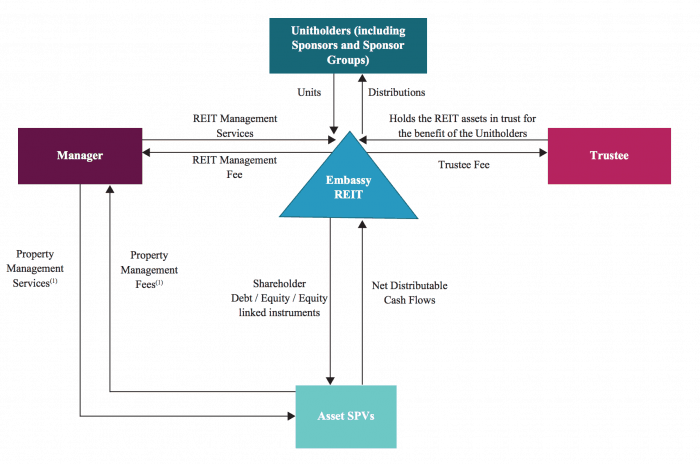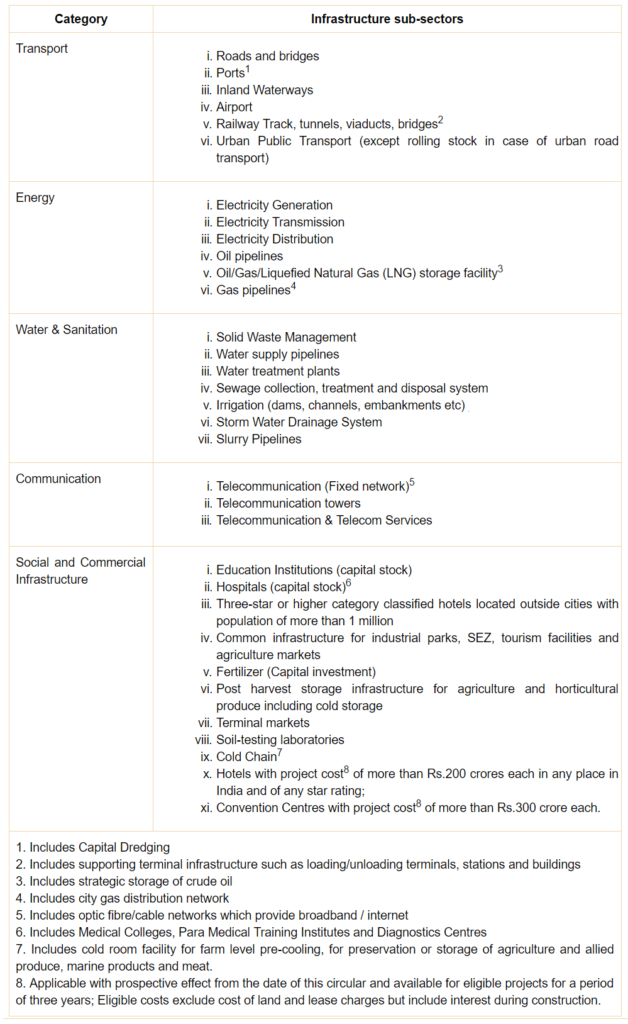Last Updated on December 29, 2021 at 12:18 pm
Here is a ready reckoner FAQ on the basics Real Estate Investment Trusts (REIT’s) and Infrastructure Investment Trusts (InvITs) in the form of an FAQ. This covers key information for the layman and is meant to serve as a basic introduction. With Embassy office Park REIT IPO, there is a renewed interest in these instruments. However, investors should be cautious and avoid them as the risk are unknown and the expected reward not high enough.
FAQ on Real Estate Investment Trusts (REIT’s)
1: What are REITs? It is a mutual fund that invests in real estate. It has a structure that is similar to how mutual fund houses operate. The following a screenshot from page 64 from the offer document of Embassy Park REIT (download link below)

2: Where can they invest? Commercial real estate only through a special investment vehicle (a 3rd party firm) or directly.
Join 32,000+ readers and get free money management solutions delivered to your inbox! Subscribe to get posts via email! (Link takes you to our email sign-up form)

🔥Want to create a complete financial plan? Learn goal-based investing? Exclusive access to our DIY tools? Increase your income with your skills? Use this link to enjoy massive discounts on our robo-advisory tool & courses! 🔥
3: What is the asset allocation? Eighty per cent in completed rent-generating properties. Rest in cash, money market bonds, govt or corporate bonds, realty stocks and property under construction.
4: What is the minimum investment required? Two lakh. And when it is listed in the exchange the trading lot will be worth one lakh.
For the Embassy Office Parks REIT, You will have to buy a minimum of 800 units at Rs. 300 per unit or Rs, 2.4 Lakh.
5: Will I get a dividend? There is no “growth” option! Twice a year (at least), the REIT will have to distribute 90% of the income as a dividend. There will also be some growth in the value of the units
6: How are they taxed? The dividends are tax-free. The dividend distribution tax associated with them has been scrapped. Moreover, capital gains from units less than 3Y old will be taxed at 15%+ cess and above that is taxed at 10% +cess.
7: What are the risks? The REIT combines the concentration risk of a sectoral mutual fund and the credit risks of a debt mutual fund. Legal issues in ownership and construction or occupation delays can hit income. Recessions can hit developing commercial real estate pretty bad. There can be defaults or lack of tenants. There is no benchmark to compare with, aside from say, a fixed deposit. Rental yields are low and hence one cannot expect inflation-beating returns (inflation will be the at the lending rate).
8: How much return can I expect from a REIT: If you refer to page 79 of the Embassy Office Parks Offer Document, the RE income yield from India is about 7.5-8.5%. In a nice review, S R Srinivasan calculates a projected yield of 7.44% for Embassy Parks REIT in FY 2020. This is simply not worth the associated risk in my opinion.
9: My equity or debt mutual fund wants to invest in REIT. Is it okay to continue with it? Yes. The investment limit is capped at 10%. If you invest directly in a REIT, the risk would be much higher. Even if the REIT portion does not result in better returns, it could (repeat, could) lead to better diversification and lower risk. This remains to be seen though. There is no need to exit a fund just because it wants a slice of the REIT or InvIT pie.
10: What is the structure of a REIT? Besides the unit holder (you or me) on one end and the asset (the property) on the other, there are three other entities:
- The sponsor who set up the REIT and hold the min no of units to make it valid.
- The sponsor appoints a Trustee who holds the investor units and oversees the fund management.
- The fund manager who is responsible for security selection

A FAQ on Infrastructure Investment Trusts (InvITs)
1: What are InvIT’s? An InvIT is a mutual fund that investments in infrastructure projects as defined by the Ministry of Finance.
2: Where can they invest? In projects such as these. Source: RBI
3: What is the asset allocation?
There are two types of InvITs.
Public InvITs have to invest greater than 80% in completed revenue generating projects and not more than 10% in under construction projects.
Private InvITs can have more than 10% in under construction projects.
4: What is the minimum investment required?
Public InvITs: 10 Lakh
Private InvITs: 1 Crore
5: Will I get a dividend? There is no “growth” option! Twice a year (at least), the public or private InvIT will have to distribute 90% of the income as a dividend.
6: How are they taxed? The dividends are tax-free. The dividend distribution tax associated with them has been scrapped. Moreover, capital gains from units less than 3Y old will be taxed at 15%+ cess and above that, it is 10% +cess.
7: What are the risks? In addition to the risks associated with REITs, the possibility of government intervention is a risk to the amount of income one can generate with this instrument.
8: What is the structure of an InvIT? In addition, the three entities associated with a RIET, an InvIT also has a project manager to undertake projects (need to learn more about this).
This covers the basic ground on both these instruments. Do let me know if there are any mistakes or anything important has been left out. Will update this FAQ from time to time.
Should you invest? As of now enjoy the 10% REIT or InvIT stake in equity/debt mutual funds and don’t get your hands messy directly. My impression is that the reward may not be in proportion to the investment ticket and risks involved. Once the NAV data is available, we can take a deeper look. If I am going to get fixed income kind of return, then I must only take on fixed income kind of risk. REITs have far higher risk and therefore make no sense.

Use our Robo-advisory Tool to create a complete financial plan! ⇐More than 3,000 investors and advisors use this! Use the discount code: robo25 for a 20% discount. Plan your retirement (early, normal, before, and after), as well as non-recurring financial goals (such as child education) and recurring financial goals (like holidays and appliance purchases). The tool would help anyone aged 18 to 80 plan for their retirement, as well as six other non-recurring financial goals and four recurring financial goals, with a detailed cash flow summary.
🔥You can also avail massive discounts on our courses and the freefincal investor circle! 🔥& join our community of 8000+ users!
Track your mutual funds and stock investments with this Google Sheet!
We also publish monthly equity mutual funds, debt and hybrid mutual funds, index funds, and ETF screeners, as well as momentum and low-volatility stock screeners.
You can follow our articles on Google News

We have over 1,000 videos on YouTube!

Join our WhatsApp Channel



- Do you have a comment about the above article? Reach out to us on Twitter: @freefincal or @pattufreefincal
- Have a question? Subscribe to our newsletter using the form below.
- Hit 'reply' to any email from us! We do not offer personalised investment advice. We can write a detailed article without mentioning your name if you have a generic question.
Join 32,000+ readers and get free money management solutions delivered to your inbox! Subscribe to get posts via email! (Link takes you to our email sign-up form)
About The Author
 Dr M. Pattabiraman (PhD) is the founder, managing editor and primary author of freefincal. He is an associate professor at the Indian Institute of Technology, Madras. He has over 13 years of experience publishing news analysis, research and financial product development. Connect with him via Twitter(X), LinkedIn, or YouTube. Pattabiraman has co-authored three print books: (1) You can be rich too with goal-based investing (CNBC TV18) for DIY investors. (2) Gamechanger for young earners. (3) Chinchu Gets a Superpower! for kids. He has also written seven other free e-books on various money management topics. He is a patron and co-founder of “Fee-only India,” an organisation promoting unbiased, commission-free, AUM-independent investment advice.
Dr M. Pattabiraman (PhD) is the founder, managing editor and primary author of freefincal. He is an associate professor at the Indian Institute of Technology, Madras. He has over 13 years of experience publishing news analysis, research and financial product development. Connect with him via Twitter(X), LinkedIn, or YouTube. Pattabiraman has co-authored three print books: (1) You can be rich too with goal-based investing (CNBC TV18) for DIY investors. (2) Gamechanger for young earners. (3) Chinchu Gets a Superpower! for kids. He has also written seven other free e-books on various money management topics. He is a patron and co-founder of “Fee-only India,” an organisation promoting unbiased, commission-free, AUM-independent investment advice.Our flagship course! Learn to manage your portfolio like a pro to achieve your goals regardless of market conditions! ⇐ More than 3,500 investors and advisors are part of our exclusive community! Get clarity on how to plan for your goals and achieve the necessary corpus no matter the market condition!! Watch the first lecture for free! One-time payment! No recurring fees! Life-long access to videos! Reduce fear, uncertainty and doubt while investing! Learn how to plan for your goals before and after retirement with confidence.
Increase your income by getting people to pay for your skills! ⇐ More than 800 salaried employees, entrepreneurs and financial advisors are part of our exclusive community! Learn how to get people to pay for your skills! Whether you are a professional or small business owner seeking more clients through online visibility, or a salaried individual looking for a side income or passive income, we will show you how to achieve this by showcasing your skills and building a community that trusts and pays you. (watch 1st lecture for free). One-time payment! No recurring fees! Life-long access to videos!
Our book for kids: “Chinchu Gets a Superpower!” is now available!


Must-read book even for adults! This is something that every parent should teach their kids right from their young age. The importance of money management and decision making based on their wants and needs. Very nicely written in simple terms. - Arun.Buy the book: Chinchu gets a superpower for your child!
How to profit from content writing: Our new ebook is for those interested in getting a side income via content writing. It is available at a 50% discount for Rs. 500 only!
Do you want to check if the market is overvalued or undervalued? Use our market valuation tool (it will work with any index!), or get the Tactical Buy/Sell timing tool!
We publish monthly mutual fund screeners and momentum, low-volatility stock screeners.
About freefincal & its content policy. Freefincal is a News Media organisation dedicated to providing original analysis, reports, reviews and insights on mutual funds, stocks, investing, retirement and personal finance developments. We do so without conflict of interest and bias. Follow us on Google News. Freefincal serves more than three million readers a year (5 million page views) with articles based only on factual information and detailed analysis by its authors. All statements made will be verified with credible and knowledgeable sources before publication. Freefincal does not publish paid articles, promotions, PR, satire or opinions without data. All opinions will be inferences backed by verifiable, reproducible evidence/data. Contact Information: To get in touch, please use our contact form. (Sponsored posts or paid collaborations will not be entertained.)
Connect with us on social media
- Twitter @freefincal
- Subscribe to our YouTube Videos
- Posts feed via Feedburner.
Our publications
You Can Be Rich Too with Goal-Based Investing
 Published by CNBC TV18, this book is designed to help you ask the right questions and find the correct answers. Additionally, it comes with nine online calculators, allowing you to create custom solutions tailored to your lifestyle. Get it now.
Published by CNBC TV18, this book is designed to help you ask the right questions and find the correct answers. Additionally, it comes with nine online calculators, allowing you to create custom solutions tailored to your lifestyle. Get it now.Gamechanger: Forget Startups, Join Corporate & Still Live the Rich Life You Want
 This book is designed for young earners to get their basics right from the start! It will also help you travel to exotic places at a low cost! Get it or gift it to a young earner.
This book is designed for young earners to get their basics right from the start! It will also help you travel to exotic places at a low cost! Get it or gift it to a young earner.Your Ultimate Guide to Travel
 This is an in-depth exploration of vacation planning, including finding affordable flights, budget accommodations, and practical travel tips. It also examines the benefits of travelling slowly, both financially and psychologically, with links to relevant web pages and guidance at every step. Get the PDF for Rs 300 (instant download)
This is an in-depth exploration of vacation planning, including finding affordable flights, budget accommodations, and practical travel tips. It also examines the benefits of travelling slowly, both financially and psychologically, with links to relevant web pages and guidance at every step. Get the PDF for Rs 300 (instant download)
